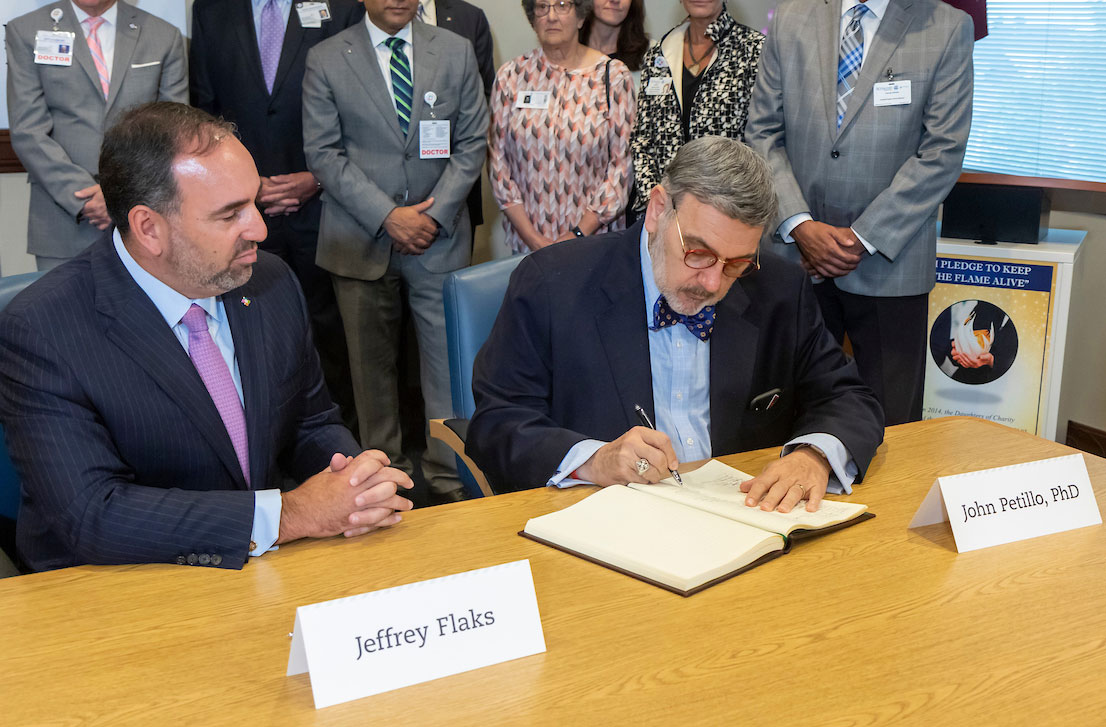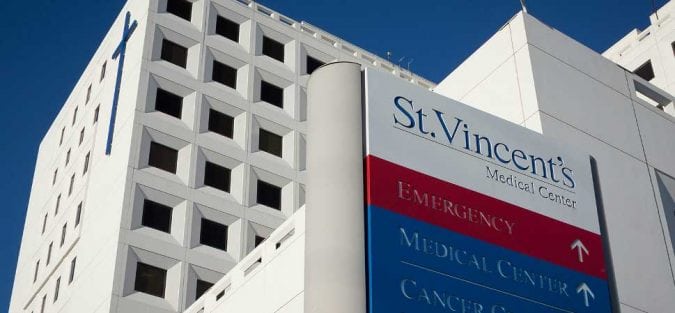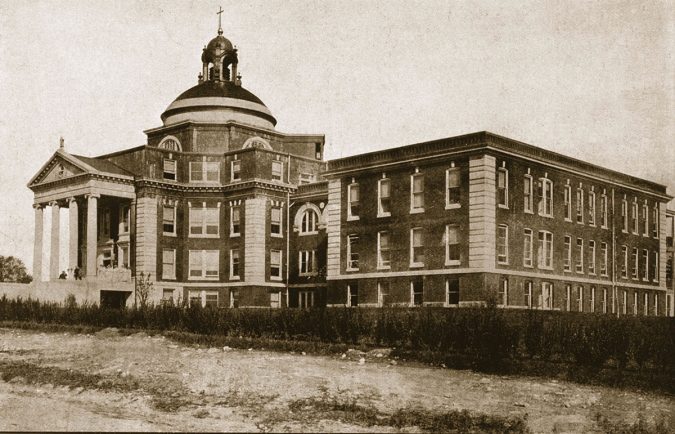<< Back
Why St. Vincent’s, the Daughters of Charity and Hartford HealthCare are the Right Fit

October 02, 2019
BRIDGEPORT — The ceremony Tuesday officially binding St. Vincent’s Medical Center, a Catholic hospital that traces its history to the early 1900s and the Daughters of Charity of St. Vincent de Paul, with Hartford HealthCare did not pass without at least one revelation.
“Who believes in fate?” asked Vincent DiBattista, St. Vincent’s new president.
DiBattista, a Catholic, then described his confirmation several decades ago in a Pennsylvania church when he chose as his patron saint that same Vincent de Paul, a 17th-century French priest who dedicated his life to serving the poor. As his middle name, DiBattista chose Paul. And he later named his son Paul.
“So if that’s not weird, I don’t what is,” he said.
It was a perfect preliminary to the signing ceremony in the hospital board room marking St. Vincent’s transition from Ascension to Hartford HealthCare, whose attendees included Hartford HealthCare President and CEO Jeffrey A. Flaks and the Most Rev. Frank Caggiano, Bishop of Bridgeport. It marked a new day for the St. Vincent’s staff, which had known since early 2017 that a merger or sale was possible. Little more than a year later, Hartford HealthCare announced plans to create a new Fairfield County region that would include St. Vincent’s.
Dave Ingmanson, a 35-year St. Vincent’s employee, offered the prospective deal an enthusiastic thumbs-up in public testimony before the Connecticut Office of Health Strategy in April. Now that the deal’s official, he’s eager to see how Hartford HealthCare might work with St. Vincent’s.
“It’s important to me that we are being acquired by the leading system in Connecticut, because Hartford HealthCare knows how to navigate through the challenges of operating in this state,“ he said.
Already, Hartford HealthCare has found a new primary-care partner, Soundview Medical Associates, with 30 primary care and specialty care physicians in Norwalk and Darien. It’s also newly affiliated with Bridgeport’s Visiting Nurse Services of Connecticut, which offers home and hospice care in Fairfield, New Haven and Litchfield counties.
“We’ll have the ability to build bigger, stronger programs,” said Flaks, shown above at the signing with John Petillo, chairman of the St. Vincent’s board of trustees who now becomes chairman of the Hartford HealthCare Fairfield Region Board. “We’ll create more access. We’ll be stronger at recruiting physicians and other national leaders to our system, as we have more to offer. So we’re excited.”
Hartford HealthCare and St. Vincent’s:
What’s The Deal?
St. Vincent’s, a 473-bed tertiary-care hospital, becomes the seventh hospital — and the second-largest after Hartford Hospital’s 867 beds — in the Hartford HealthCare system. St. Vincent’s, which includes a 76-bed inpatient psychiatric facility in Westport, a large multispecialty provider group and St. Vincent’s Special Needs Services, adds 3,500 employees to Hartford HealthCare’s 21,000-plus.
St. Vincent’s offers regional centers of excellence in:
St. Vincent’s Health Services include:
 St. Vincent’s Medical Center in Bridgeport.
St. Vincent’s Medical Center in Bridgeport.
St. Vincent’s is also the first Catholic hospital in the Hartford Hospital system. A Catholic hospital follows the Ethical and Religious Directives published by the U.S. Conference of Catholic Bishops.
St. Vincent’s Catholic history begins at the arrival of the 20th century with a needs assessment by the Daughters of Charity (of St. Vincent de Paul), a Maryland chapter of this Society of Apostolic Life founded in France and known for its work in hospitals, orphanages and schools. Yes, affirmed the group, Bridgeport needed a second hospital. Where Main Street met Hawley Avenue, the last stop on the Bridgeport trolley line at Hawley Farm, a 75-bed building was incorporated as St. Vincent’s Hospital on May 19, 1903 (see photo below). The cost, $250,000, looks like a relative bargain in today’s dollars: about $7.3 million.
 St. Vincent’s Hospital, circa 1905, in Bridgeport.
St. Vincent’s Hospital, circa 1905, in Bridgeport.
By the time the hospital opened in mid-1905, its cupola (and towering Catholic cross), was on its way to becoming a city landmark. By the mid-1970s, however, with the hospital hopelessly outdated the Daughters of Charity and the St. Vincent’s board of directors contemplated a move to Fairfield before building a new hospital behind the original. The Fairfield land it had purchased was sold to General Electric, which turned it into its headquarters at the time.
The new hospital, a 440,000-square-foot building now known as St. Vincent’s Medical Center, opened on Palm Sunday in 1976. In 2003, ambulatory services, operating suites and a 30-bed intensive care unit were part of a 70,000-square-foot expansion that cost $40 million. St. Vincent’s latest landmark, the front of the Elizabeth M. Pfriem SWIM Center for Cancer built in 2010, resembles a pier as a salute to a primary fundraiser — SWIM Across the Sound.
St. Vincent’s: The Next Chapter
Many St. Vincent’s employees now see Hartford Healthcare as a lifeline, an in-state connection that understands the vagaries of Connecticut medicine.
“We found that, under Ascension, there were many challenges with understanding the dynamics and needs with the patient population in our community,” said Chenese Nicholas, senior director of clinical operations-surgical services and a 14-year St. Vincent’s employee. “If St. Vincent’s needs to be aligned with another organization, it is essential that it’s a system that is in the state. I believe there will be a better understanding of the culture, market, physician relations and challenges within the state.”
Flaks, in remarks before the signing, described Hartford HealthCare as brimming with executives born and raised in the state.
“We’re 100 percent committed to Connecticut,” he said.
He also offered Hartford HealthCare’s three-point blueprint to revive this hospital in Connecticut’s largest city:
- Access: “We want to dramatically improve access to all people in all circumstances.
- Expertise: “We want to bring more expertise, more levels of care to this region than has ever been here before.”
- Community: “It’s about being deeply embedded and serving the community.”
DiBattista, who now assumes day-to-day control of the hospital, said movement will come swiftly to St. Vincent’s.
“My goal is we will see significant change for the better in six months,” he said. “But we want to be in the black. In my view, it’s going to take at least the next 24 months.”
To learn more about St. Vincent’s Medical Center, click here.
St. Vincent’s Hospital, circa 1905, in Bridgeport.[/caption]
By the time the hospital opened in mid-1905, its cupola (and towering cross), was on its way to becoming a city landmark. By the mid-1970s, however, with the hospital outdated the Daughters of Charity and the St. Vincent’s board of directors contemplated a move to Fairfield before building a new hospital behind the original. The Fairfield land it had purchased was sold to General Electric, which turned it into its headquarters at the time.
The new hospital, a 440,000-square-foot building now known as St. Vincent’s Medical Center, opened on Palm Sunday in 1976. In 2003, ambulatory services, operating suites and a 30-bed intensive care unit were part of a 70,000-square-foot expansion that cost $40 million. St. Vincent’s latest landmark, the front of the Elizabeth M. Pfriem SWIM Center for Cancer built in 2010, resembles a pier as a salute to a primary fundraiser — SWIM Across the Sound.
St. Vincent’s: The Next Chapter
Many St. Vincent’s employees now see Hartford HealthCare as creating an in-state connection that has a complete continuum of care statewide.
“If St. Vincent’s needs to be aligned with another organization, it is essential that it’s a system that is in the state,” said Chenese Nicholas, senior director of clinical operations-surgical services and a 14-year St. Vincent’s employee. “I believe there will be a better understanding of the culture, market, physician relations and challenges within the state.”
Flaks, in remarks before the signing, described Hartford HealthCare as brimming with executives born and raised in the state.
“We’re 100 percent committed to Connecticut,” he said.
He also offered Hartford HealthCare’s three-point blueprint to revive this hospital in Connecticut’s largest city:
- Access: “We want to dramatically improve access to all people in all circumstances.
- Expertise: “We want to bring more expertise, more levels of care to this region than has ever been here before.”
- Community: “It’s about being deeply embedded and serving the community.”
To learn more about St. Vincent’s Medical Center, click here.